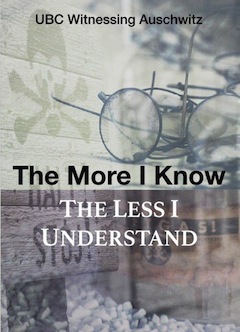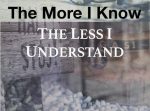The book The More I Know, the Less I Understand (Auschwitz-Birkenau State Museum, 2017) summarizes the findings of University of British Columbia students in various fields of Holocaust research and the implications of Nazi German crimes committed in Central and Eastern Europe.
It is often claimed that, since the events of the Holocaust took place more than 70 years ago, most of the available information has already been collected and there is little chance of gaining new knowledge about what happened. This claim, often made without substantial questioning, has been debunked by, among others, a group of UBC students who traveled to Poland on the Witnessing Auschwitz Program from 2014 to 2016.
The young scholars conducted extensive fieldwork and consulted with world-class experts in Holocaust studies at the Auschwitz-Birkenau State Museum, the Emanuel Ringelblum Jewish Historical Institute and other organizations; they also used primary-source archival documents. Each of the student essays in The More I Know, the Less I Understand is accompanied by footnotes prepared by experts in the field. The essays show that many complexities of human life and politics, and historic processes associated with the Holocaust and the Second World War, remain understudied. Over the course of the Witnessing Auschwitz Program, the students found more questions to ask with every answer they were able to uncover.
The uniqueness of this volume and its substantial contribution to the market of knowledge rests on the comprehensiveness of the analysis – largely resulting from the diverse areas of expertise of the individual scholars. Furthermore, the authors in the book write on various subjects that have largely remained untouched in Canadian academia: the profitability of the work camps for the German economy; the artistic expression of prisoners; moral dilemmas, such as betrayal of others for the sake of survival; and complex emotions such as love.
 Importantly, various authors in this volume critique the methods by which the contemporary public is educated about events that took place before and during the Holocaust. For example, a common misconception exists, often reinforced through the education system and media, that the rationale for the crimes committed by the Nazi German regime was primarily rooted in ideological conviction. The essays in The More I Know, the Less I Understand collectively show that the motivations behind Nazi German actions prior to and during the Second World War were far more complex.
Importantly, various authors in this volume critique the methods by which the contemporary public is educated about events that took place before and during the Holocaust. For example, a common misconception exists, often reinforced through the education system and media, that the rationale for the crimes committed by the Nazi German regime was primarily rooted in ideological conviction. The essays in The More I Know, the Less I Understand collectively show that the motivations behind Nazi German actions prior to and during the Second World War were far more complex.
In early chapters, a number of the scholars correctly point out that the state of the economy was a major motivator for the leadership of the Third Reich. For example, Maria Dawson, in her chapter, “The Role of Food in the Development and Implementation of Nazi German Policies,” writes that the ethnic cleansing of Poles, commonly tied to the ideological motives of Nazi Germany, was substantially rooted in the perceived need of the Nazi regime for agricultural land to support their war effort. Joe Liu, in his chapter, “Deciphering Business Relationships in Nazi German-occupied Europe,” notes that the collection of data on prisoners entailed the development and modernization of mass data collection technology, particularly aided by IBM. The More I Know, the Less I Understand is full of such details, which are often surprising. The book not only breaks common misconceptions about the Holocaust, but provides a comprehensive picture of some of the real reasons behind Nazi crimes.
Because educating Canadian scholars and the public at large about the Holocaust will continue to be important for future generations, the methods of education on the subject must evolve. Helena Bryn-McLeod writes that, because of its importance in our daily environment, the Auschwitz-Birkenau State Museum recently joined various dominant social media networks. Since more people are using the internet than are reading books, social media is, as Bryn-McLeod identifies, “a new mode of remembering.”
Social media can also be an effective tool for the storage and capture of memories in an environment where there are fewer and fewer remaining survivors and other primary carriers of Holocaust memories. Moreover, Bryn-McLeod notes that social media conveys information to readers in similar ways as traditional forms of representation, such as journals and books – through photographs and other visuals – so little content will be lost with the transition to this new mode of memory. However, she acknowledges that, with the internet, new concerns have emerged, such as visitors taking offensive photographs in front of memorial sites and posting them. So, while the rise of fast-access media enables educators to reach a broader audience, Bryn-McLeod warns that ethical issues will continue to arise.
The More I Know, the Less I Understand holds valuable lessons. Notably, it highlights the dangers of adopting radical ethno-nationalistic positions, which, historically, have yielded catastrophic results. In his writing, Mark Twain brilliantly noted that “history does not repeat itself, but it does rhyme.” With the rebirth of populist political discourses in the West and elsewhere, the collection of works in The More I Know, the Less I Understand stresses that it is our responsibility, as a society, through education and awareness, to prevent certain chapters from history to rhyme with future chapters. Ultimately, this unique publication should be a foundational resource in Canadian scholarly environments – and elsewhere – where the subjects of the Holocaust and the Second World War are covered.
Dani Belo is a PhD student at the Norman Paterson School of International Affairs (NPSIA) at Carleton University in Ottawa, specializing in international conflict analysis and resolution. He is the editor-in-chief of the Paterson Review of International Affairs, associate editor at iAffairs Canada and contributing author in various publications for the NATO Association of Canada and the Canadian Global Affairs Institute. His area of research is international security, evolution of Russia-NATO relations, and inter-ethnic relations in the post-Soviet region.
***
The More I Know, the Less I Understand can be purchased at the UBC Bookstore or from the Auschwitz-Birkenau State Museum.


